Fireplace grates: features of choice

The fireplace has become a fashionable element of the interior design. It can be stylized for any interior - from classic to high-tech. The main purpose of the fireplace is a decorative function, as well as creating an atmosphere of comfort with the help of an open fire. Heating a room with a fireplace is worse than with other heating appliances. To improve the circulation of warm air heated in the fireplace, it is necessary to install ventilation grilles on the box.
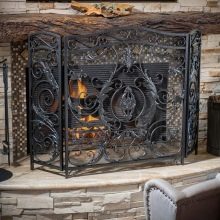
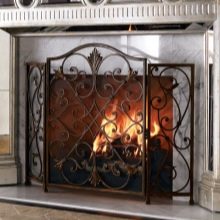
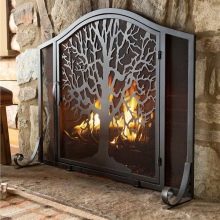
Purpose of ventilation in the fireplace
Usually, one grate is installed below the level of the firebox to take in cold air from the outside. This is the air intake. The other two, installed above the fireplace insert on the duct, are designed to extract warm air.
By installing such grates in their fireplace, users get several beneficial advantages at once:
- The supply of warm air is improved, thereby increasing the heating of the room.
- The likelihood of overheating of the air duct, the facing material of the fireplace and the surface of the firebox decreases, which significantly extends the service life of the structure.
- The room acquires an attractive appearance due to the external design of the grilles for the style and design of the room.
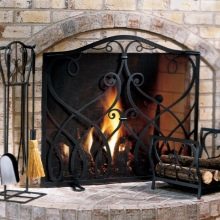
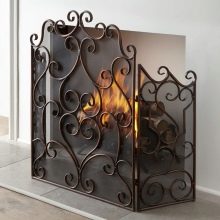
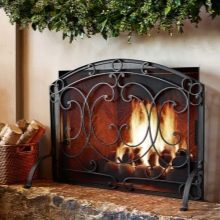
In a corner fireplace, it is better to install one large upper grate without splitting the air flow in two directions.
Lattice types
Ventilation grilles differ in shape, size, material, installation method, availability of additional elements and capabilities.
Each feature is characterized in its own way:
- Lattices can be round, square, rectangular, polygonal, oval and complex in shape. It depends on the preference of the owner of the fireplace. The holes in the grill also have their own shape and depend on the design of the product. Holes can be: slotted, round, square, rectangular, complex shape.
- The size of the grate is determined by the size of the room and the power of the fireplace. In a small room, you can install medium-sized grilles. Larger rooms require more warm air for heating. But too large dimensions of the product will not be able to provide the required flow of warm air.
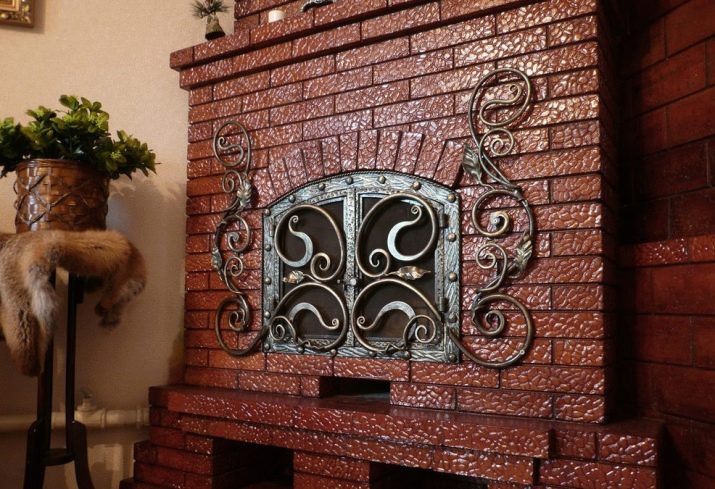
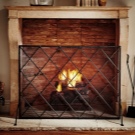
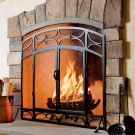
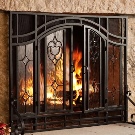
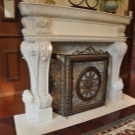
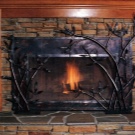
The size of the holes on the grill is also important to consider. If they are too small, then warm air will not be able to flow freely from the duct, and the very meaning of the ventilation device will be lost. The openings should facilitate the removal of warm streams, giving them time to warm up, but not interfering with the streams entering the room. The material of manufacture must withstand high temperatures and have a long service life.
For ventilation grilles used:
- cast iron;
- steel;
- aluminum;
- ceramics.
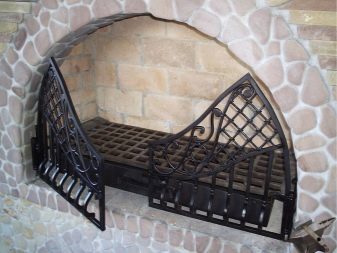
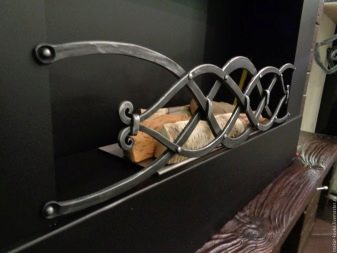
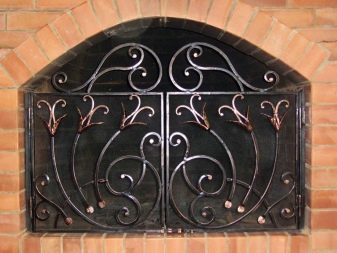
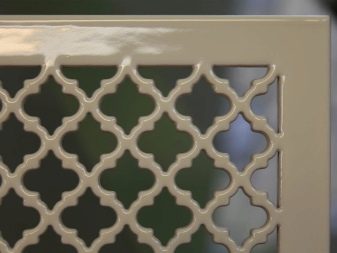
A large selection of purchased models saved many of the worries about which grille to choose. If you wish, skill and diligence, you can make a suitable model yourself.
- Lattice models cast iron have elements of forging and casting. Attractive and stylish look makes you choose this material. Pattern and design are varied and unique. Craftsmen can create a unique masterpiece in one copy for one fireplace.
- Lifetime cast iron at high temperatures is higher than other materials, making it popular. The downside of this material is its great weight.
Steel and aluminum gratings are welded from separate parts to obtain the desired pattern with the required holes.Such gratings are coated with heat-resistant paint or treated with an electroplating solution to give them a pleasant appearance and durability.
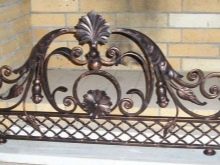
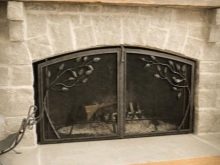
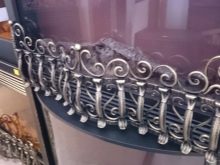
- Installation method. The grilles can have an inner box, be built-in or overhead. Built-in models are more reliable, they adhere more tightly to the walls of the ventilation openings, do not create gaps and do not allow combustion waste to pass through. Overhead grilles are easy to install, so they are in high demand among consumers. You can also make them yourself.
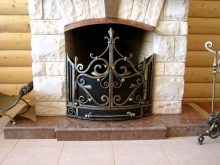
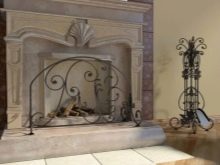
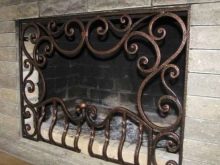
- The presence of additional elements. Functional is the presence of louvers on the grill, which are able to control and direct the movement of air, depending on the width of the opening of the holes.
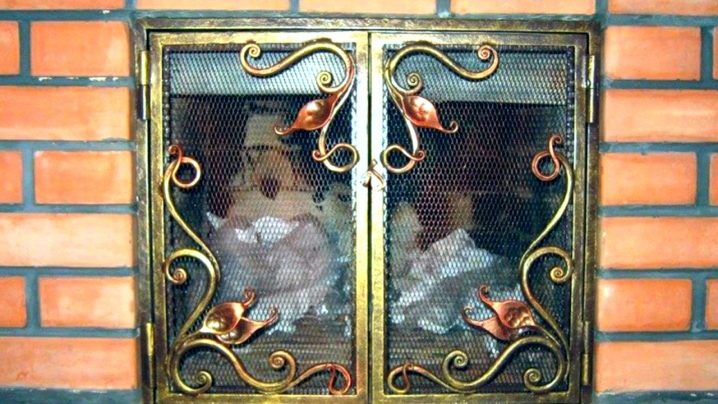
Opening flaps in the form of doors or a hatch help regulate the flow of air into the room, as well as open access to the inside of the fireplace for inspection.
An additional mesh with small holes is needed to protect the fireplace from insects from entering, especially in the warm season.
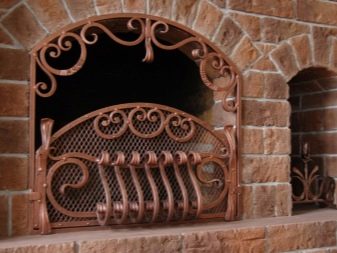
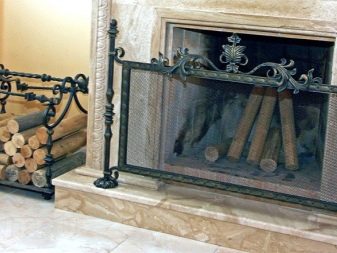
There is a variant of a fixed installation of the grille and a removable variant. In a removable design, the frame is usually attached to the ventilation hole, and the grille itself can either be completely removed, or moved to the side or up and down. Such a model can open an overview inside the fireplace.
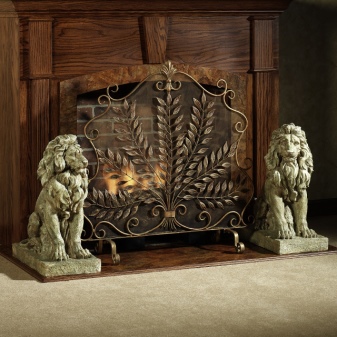
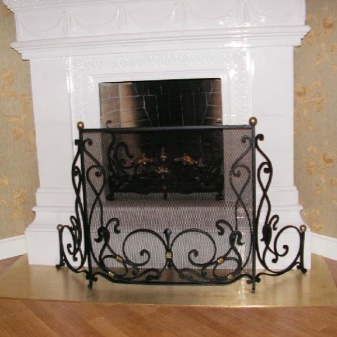
Installation features
The grilles are installed during the installation of the fireplace or during its use. When installing, it is important to calculate the correct level of the hole from the floor and the distance from the walls next to which the fireplace is located.
The calculation takes into account the following points:
- The movement of air flows inside the fireplace should be directed towards the grates.
- The maximum heated air outlet must be at least 300 mm from the ceiling level.
- The grate should not be directed towards the wall next to the fireplace, but into the open space of the room.
- The opening for the grill should be as far away from the doorway as possible.
- The ceiling made of combustible materials should not be affected by the proximity of the fireplace ventilation.
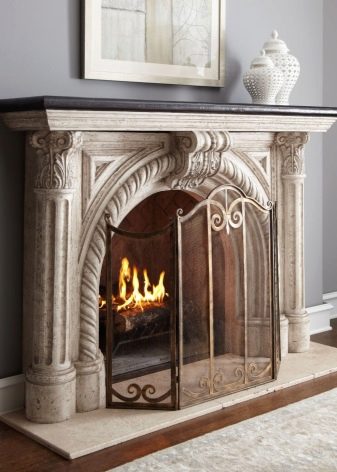
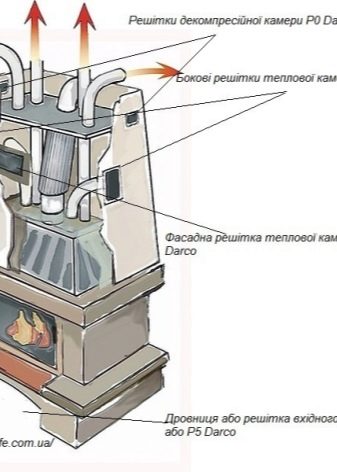
For installation in a ready-made fireplace, a hole is first cut at the required distance, which should be 3-4 mm larger than the internal size of the grate. A nail with a wire is driven into the wall of the box, which is wrapped around the nail. The protective grill is inserted into the resulting hole and is treated with heat-resistant sealed material around the perimeter. It is important to achieve a snug fit of the box to the walls of the fireplace.
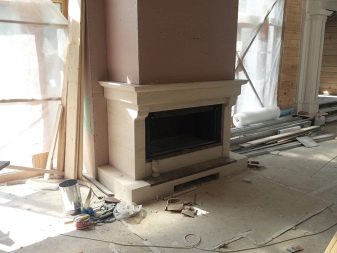
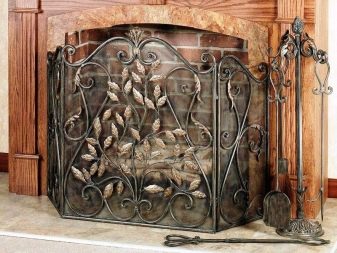
Loss of airtightness causes heat loss and can create a situation where smoke or soot can enter the room.
Care of the product
The fireplace grates are cleaned as needed. It is advisable to carry out it at least once every six months. It is better to do this after the end of the heating season. The grille with small holes must be cleaned more often than with large holes.
Covered with dirt, the grille will not let warm air pass well and perform its basic functions. After cleaning, the ventilation grill can be closed before using the fireplace, which will protect it from external contamination and insects from entering the fireplace.
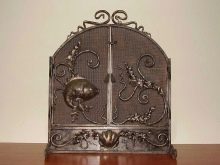
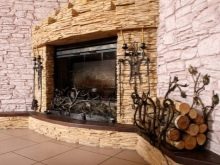
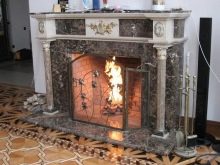
DIY making
A metal grid of a square or rectangular size can be made with your own hands if you have the skills to own a welding machine, grinder and locksmith tools.
For self-production you will need:
- small diameter metal bar;
- steel corner for the frame;
- fixtures for welding;
- locksmith tool.
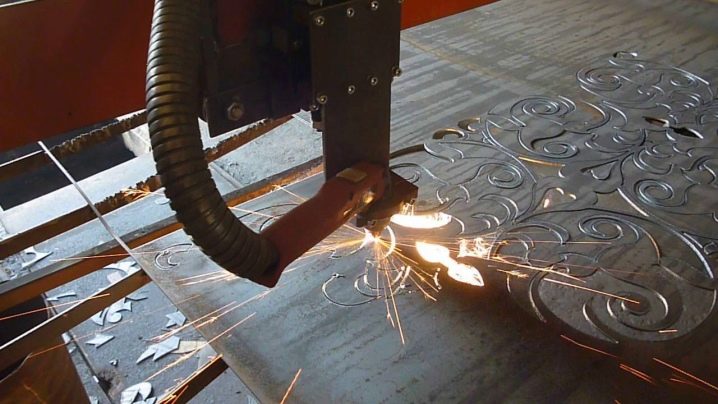
Work order:
- Draw a drawing with exact dimensions.
- Make a sketch of an ornament or just a standard grid.
- Calculate the size of the parts based on the drawing.
- Saw off 4 corner pieces and weld the frame. The frame must be made 3-4 mm larger than the hole in the fireplace.
- Take the rods in the required quantity and saw off to the required size.
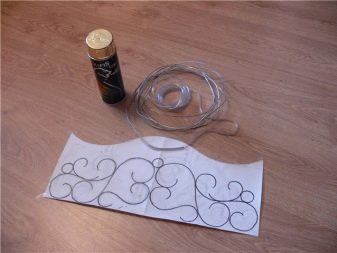
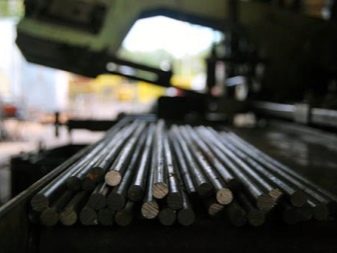
- Try them on by attaching them to the frame.Weld the rods according to the sketch.
- Treat welding seams to achieve an aesthetic appearance.
- Weld the resulting lattice to the frame.
- Cover the finished product with heat-resistant paint in several layers.
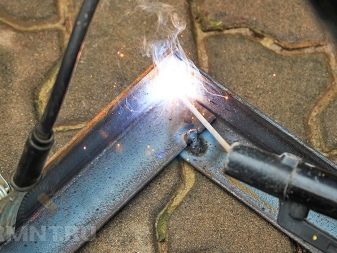
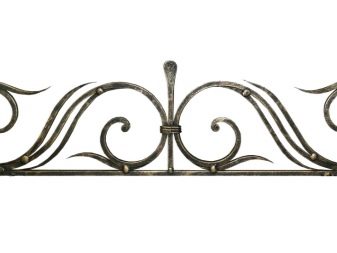
Install in 2-3 days after production, when the paint is completely dry.
Air direction
For the correct use of the heated air, a fan is installed inside the fireplace.
The use of a fan to improve air circulation inside the chimney should be advisable. The power and direction should promote optimal heating of air masses and their removal through the holes in the grill. Otherwise, the opposite effect may turn out.
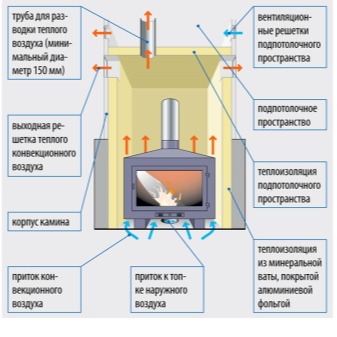
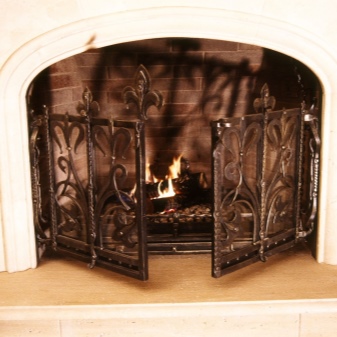
Screens
The grilles should not be confused with fireplace screens, which are installed directly in front of the fireplace insert. Screens are designed to protect the room from sparks and other products of firewood combustion.
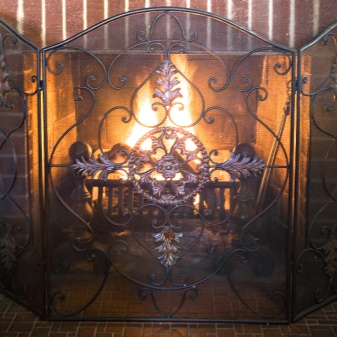
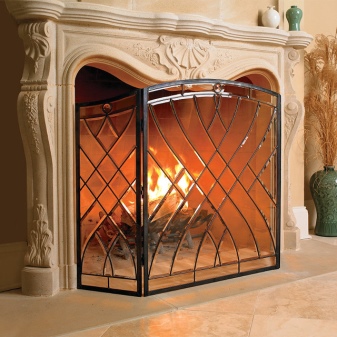
The screen can be of different types: glass, metal, ceramic or a combination of different materials. Modern heat-resistant material such as fire-resistant fabric can be used. The metal screen can be blank, mesh or in the form of a lattice with an ornament. Convection screens can be made in the form of a screen, stand alone or fixed to the floor or fireplace. They are straight, curved, single-section and multi-section.
The screen also serves as a decorative decoration for the interior. In addition, it helps, being near the hearth, to observe the fire without fear of overheating. It is more pleasant to look at the fire through glass or mesh, then the eyes get tired less. The cast iron grate will also become an interior decoration.
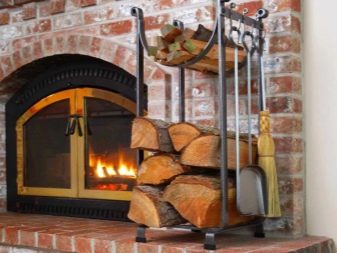
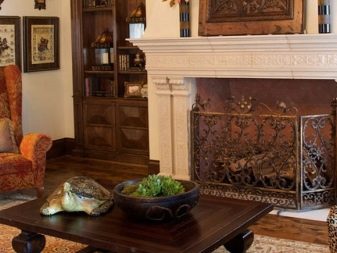
Ventilation and supply of heated air to the room is required for the operation of any heating device. The fireplace is no exception. Forged ventilation grilles are essential for proper use of the fireplace. They are not needed, unless the fireplace is used for heating, but is perceived only as an interior decoration.
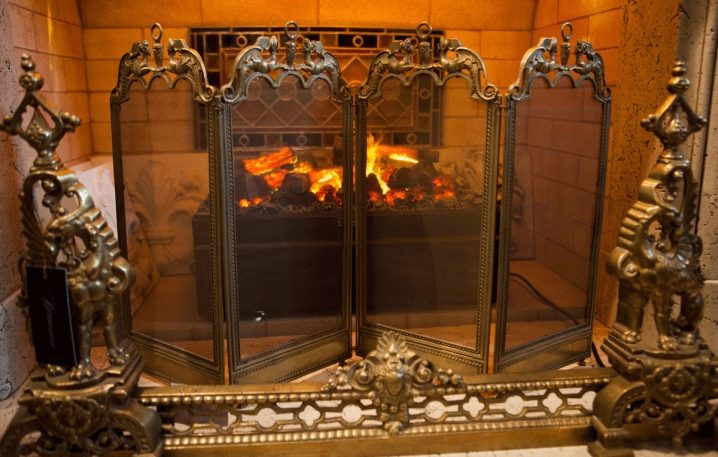
It is better to entrust the execution of work on the installation of ventilation grilles for the fireplace to a specialist who carries out the work on the installation of stoves and other heating devices. He will accurately calculate the required number of gratings, their size and height adjustment. Competently and professionally performed work will contribute to a long and effective use of the fireplace.
In the video below you can watch the manufacture of a fireplace ventilation grill.













The comment was sent successfully.